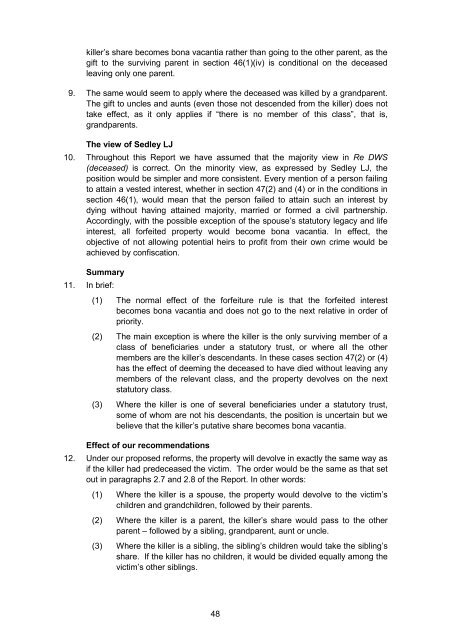The Forfeiture Rule and the Law of Succession ... - Law Commission
The Forfeiture Rule and the Law of Succession ... - Law Commission
The Forfeiture Rule and the Law of Succession ... - Law Commission
Create successful ePaper yourself
Turn your PDF publications into a flip-book with our unique Google optimized e-Paper software.
killer’s share becomes bona vacantia ra<strong>the</strong>r than going to <strong>the</strong> o<strong>the</strong>r parent, as <strong>the</strong><br />
gift to <strong>the</strong> surviving parent in section 46(1)(iv) is conditional on <strong>the</strong> deceased<br />
leaving only one parent.<br />
9. <strong>The</strong> same would seem to apply where <strong>the</strong> deceased was killed by a gr<strong>and</strong>parent.<br />
<strong>The</strong> gift to uncles <strong>and</strong> aunts (even those not descended from <strong>the</strong> killer) does not<br />
take effect, as it only applies if “<strong>the</strong>re is no member <strong>of</strong> this class”, that is,<br />
gr<strong>and</strong>parents.<br />
<strong>The</strong> view <strong>of</strong> Sedley LJ<br />
10. Throughout this Report we have assumed that <strong>the</strong> majority view in Re DWS<br />
(deceased) is correct. On <strong>the</strong> minority view, as expressed by Sedley LJ, <strong>the</strong><br />
position would be simpler <strong>and</strong> more consistent. Every mention <strong>of</strong> a person failing<br />
to attain a vested interest, whe<strong>the</strong>r in section 47(2) <strong>and</strong> (4) or in <strong>the</strong> conditions in<br />
section 46(1), would mean that <strong>the</strong> person failed to attain such an interest by<br />
dying without having attained majority, married or formed a civil partnership.<br />
Accordingly, with <strong>the</strong> possible exception <strong>of</strong> <strong>the</strong> spouse’s statutory legacy <strong>and</strong> life<br />
interest, all forfeited property would become bona vacantia. In effect, <strong>the</strong><br />
objective <strong>of</strong> not allowing potential heirs to pr<strong>of</strong>it from <strong>the</strong>ir own crime would be<br />
achieved by confiscation.<br />
Summary<br />
11. In brief:<br />
(1) <strong>The</strong> normal effect <strong>of</strong> <strong>the</strong> forfeiture rule is that <strong>the</strong> forfeited interest<br />
becomes bona vacantia <strong>and</strong> does not go to <strong>the</strong> next relative in order <strong>of</strong><br />
priority.<br />
(2) <strong>The</strong> main exception is where <strong>the</strong> killer is <strong>the</strong> only surviving member <strong>of</strong> a<br />
class <strong>of</strong> beneficiaries under a statutory trust, or where all <strong>the</strong> o<strong>the</strong>r<br />
members are <strong>the</strong> killer’s descendants. In <strong>the</strong>se cases section 47(2) or (4)<br />
has <strong>the</strong> effect <strong>of</strong> deeming <strong>the</strong> deceased to have died without leaving any<br />
members <strong>of</strong> <strong>the</strong> relevant class, <strong>and</strong> <strong>the</strong> property devolves on <strong>the</strong> next<br />
statutory class.<br />
(3) Where <strong>the</strong> killer is one <strong>of</strong> several beneficiaries under a statutory trust,<br />
some <strong>of</strong> whom are not his descendants, <strong>the</strong> position is uncertain but we<br />
believe that <strong>the</strong> killer’s putative share becomes bona vacantia.<br />
Effect <strong>of</strong> our recommendations<br />
12. Under our proposed reforms, <strong>the</strong> property will devolve in exactly <strong>the</strong> same way as<br />
if <strong>the</strong> killer had predeceased <strong>the</strong> victim. <strong>The</strong> order would be <strong>the</strong> same as that set<br />
out in paragraphs 2.7 <strong>and</strong> 2.8 <strong>of</strong> <strong>the</strong> Report. In o<strong>the</strong>r words:<br />
(1) Where <strong>the</strong> killer is a spouse, <strong>the</strong> property would devolve to <strong>the</strong> victim’s<br />
children <strong>and</strong> gr<strong>and</strong>children, followed by <strong>the</strong>ir parents.<br />
(2) Where <strong>the</strong> killer is a parent, <strong>the</strong> killer’s share would pass to <strong>the</strong> o<strong>the</strong>r<br />
parent – followed by a sibling, gr<strong>and</strong>parent, aunt or uncle.<br />
(3) Where <strong>the</strong> killer is a sibling, <strong>the</strong> sibling’s children would take <strong>the</strong> sibling’s<br />
share. If <strong>the</strong> killer has no children, it would be divided equally among <strong>the</strong><br />
victim’s o<strong>the</strong>r siblings.<br />
48
















